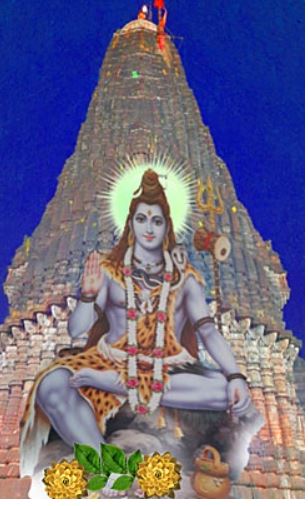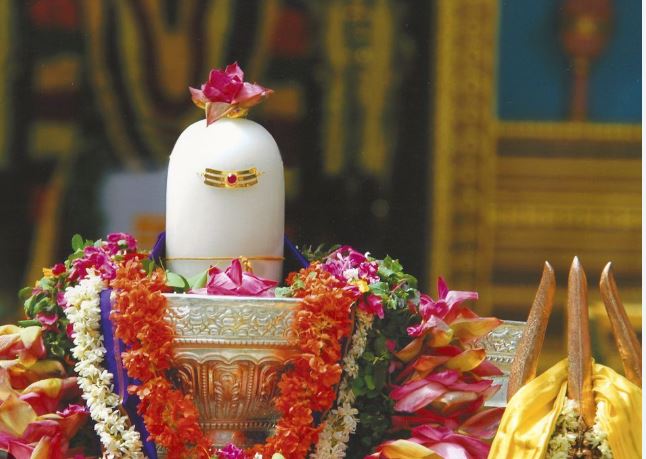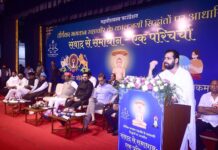Sunil Kumar D. and Geetha Patil
Mahashivratri “The Great Night of Shiva” is of great significance for all those who aspire for Moksha-the ultimate reality, enlightenment/awakening, and a worry free life. This notable festive night in Sanatana Dharma becomes a lively awakening night, marking an occasion of “overcoming darkness and ignorance” in life and in the world for all Sanatanis.It is observed by worshipping Lord Shiva, chanting Mantras and prayers, singing Bhajans, fasting, meditating and taking an oath to follow morals, ethics, and good virtues such as honesty, non-injury to others, charity, forgiveness, and the discovery of truth.
The fourteenth day of every lunar month, the day before the new moon is known as Shivratri. Among all the twelve Shivratris, Mahashivratri occurs on the 14th day of the Hindu calendar month of Phalguna, which usually falls in the months of February or March in the Gregorian calendar is of the most spiritual significance. On this night, the northern hemisphere of the planet is positioned in such a way that there is a natural upsurge of energy that is going to affect all the living beings. This energy rise in the nature is very helpful for pushing oneself towards one’s spiritual peak. That is why, this festival goes on nightlong to ensure that people stay awake by keeping their spine vertical.
 What is the deeper meaning of Lord Shiva?
What is the deeper meaning of Lord Shiva?
Destroyer of darkness is called Shiva. He is also known as the destroyer, transformer and auspicious, gracious, kind, and benevolent. The deeper meaning is that the one who worships Him, he can overcome his/her inner darkness/demonic nature through self-awareness, self-awakening and self-control. By seeking his blessings, we can transform the darkness into light both within and around us.
After your deep and concentrated meditation, when you open your eyes and look around, you will see many of His beautiful creations, if you are partially enlightened; you will see His existence in the vast emptiness/infinity, if you are really and fully enlightened. Even according to modern science also everything comes from nothing and goes back to nothing. For that reason, the vast emptiness/nothingness is referred to as Mahadeva,the great lord.
What is the Meaning of Maha Shivaratri?
Maha Shivaratri, the great night of Shiva has three words namely, Maha means great, Shiva means auspicious, and Ratri means night, which gives rest and comfort. This is the night of transcendental divine consciousness, which destroys adhyatmik, adibhoutik and adidaivik hurdles, as this great energetic night awakens every particle of our body towards truth, love, beauty, peace, and benevolence – the eternal qualities of Lord Shiva.
What is the significance of Maha Shivaratri?
According to Sanatana seers, offering prayers to Lord Shiva while staying awake on this divine night is helpful to develop our inner consciousness. Because, astrologically, on this holy day both sun and moon come in a particular alignment, which is helpful to elevate the mind and it is also a congenial night for spiritual practices, meditation, and for natural upsurge of energies in our spine. Therefore, Shiva devotees celebrate this day with great serenity, devotion, and observe a complete fast to seek the blessings of the Lord. Maha Shivaratri is the perfect day to celebrate Shivaratri in us, as there is absolutely no difference between individual soul and Lord Shiva. Spiritual seekers love to meditate to understand the higher truths of life. According to Shiva Purana, also a person who fasts on this divine day can reap the benefits of a whole year’s rigorous prayers.
What are the Maha Shivaratri rituals?
On the Maha Shivaratri, after completing the morning routines, devotees should make a Sankalp to observe a full day fasting and should break it only after the final Aarati in the mid-night or on the next day after taking bath and doing Shiva puja and prayers. On this day, devotees should take a second bath in the evening before visiting a temple of Lord Shiva. Shivaratri Puja can be performed onetime or four times during the night by offering water, milk, curd, honey, flowers, Belvapatra, and Diya to Shiva Lingam. Devotees stay awake all night at the Shiva temple or at home and listen to stories of Lord Shiva, sing Bhajans, chant Mantras to praise Lord Shiva and receive His graceful blessings.
What Mantras to chant on Shivaratri?
Panchakshari Shiva Mantra: Om Namah Shivaya
Rudra Mantra: Om Namah Bhagavate Rudraya
Rudra Gayatri Mantra: Om Tatparushaya Vidmahe Mahadevaya Dhimahi Tanno Rudrah Prachodayat
Maha Mritunjaya Mantra: Om Tryambankam Yajaamahe Sygandhim Pushtivardhanam, Utvaarukamiva Bandhanaan-mrityormuksheeya Maamritaat.
What are the different legends that narrate the importance of Maha Shivaratri?
According Sanatana scriptures, the holy river Ganga descended from the heaven to the earth on the night of Shivaratri. Lord Shiva held her in his thick matted hair and softened her journey to earth. That is why devotees offer Ganga Jal to Shiva Lingam.
On the Shivaratri day, Lord Shiva married Goddess Parvati. The legend also mentions that observing daylong fasting and worshipping Lord Shiva with great vigor can destroy all bad karmas and bestows on the couple a happy and meritorious life.
Shivaratri is celebrated to express gratitude to Lord Shiva who saved the world from the poison that emerged from the Khirsagar (sea) during Samudra Manthan. It is believed that the merciful Lord Shiva drank the poison and stored it in his throat, which made his throat turn blue. That is why, Lord Shiva is also called Neelakantha
According to Shiva Purana, when Goddess Parvati asked Lord Shiva, ‘your devotees perform various rituals to please you but which one actually pleases you the most.’ To this question, the benevolent Lord Shiva replied that the Phalguna Masa Shivaratri is His favorite one. On this day devotees observe strict spiritual discipline as well as offer Him Belvapatra and Ganga Jal that are very precious to Him than all other offerings. Therefore, all Shiva devotees follow these rituals on this day without fail.







